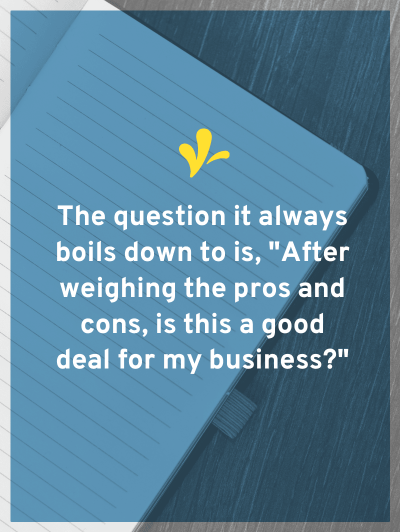Last week I got a call from a friend. The company behind the holiday show she was participating in had called her that morning. They were calling because they wanted to include her in the printed materials they would be handing out prior to the show.
She asked a couple questions about what rights they were seeking and they promised her they only wanted rights to print a limited run of postcards. She said she was interested and asked what the next steps were.
They said they would send over a contract for her to sign but that they needed it back by the end of the business day along with the image files, because they were going to print the next morning.
They needed the contract back by the end of the business day along with the image files, because they were going to print the next morning.
After the contract arrived she read it through and was concerned because the contract seemed to give them a far wider license than just a limited run of postcards. She called back her contact and expressed her concerns.
They told her that they were unable to negotiate the language of the contract but would be happy to put her in touch with their legal team if she had questions about it. She spoke with their lawyer and he assured her that while the language did allow for much more than postcards, that they would only use the images for postcards so she didn’t need to be concerned. This answer made her (rightfully) nervous. So she picked up the phone and called me and explained the situation. Then asked me what I would do if I were in her shoes.
This answer made her (rightfully) nervous.
I told her that I saw a number of contract red-flags that made me concerned. But that ultimately she needed to decide what was best for her business.
Red Flag #1: Last minute deal
I’m always curious in situations like this to find out why the deal is being done today (the day before going to print) for something that is part of the overall plan. In this case, these postcards are printed every year, so why are they waiting to contact her until the day before they go to print?
Now I’m not saying that every last minute deal is nefarious. Sometimes someone dropped the ball or pulled out at the last minute. These are valid answers that turn down the volume of the alarm bells going on in my head. But other times they are making you feel pressured to sign the deal because they know that it’s less likely that you’ll read and understand what you are agreeing to.
The piece of advice I give most often is that you should never sign a contract that you don’t understand (in fact I should get it tattooed on my forehead, it might save me a lot of time).
You should never sign a contract that you don’t understand.
And these last minute deals are ripe for pressuring creatives into signing deals they don’t fully understand because they are either told or it’s implied, that a delay will result in the deal going to someone else.
Red Flag #2: Non-negotiable deals
I’ve negotiated a lot of contracts while wearing my lawyer hat. And I always start off with the premise that the contract is negotiable, but sometimes they are not. Sadly, the reason that many deals are non-negotiable is because the other party sees the creative as a commodity: that Jewelry Designer A is just as good as Jewelry Designer B.
Sadly, the reason that many deals are non-negotiable is because the other party sees the creative as a commodity.
Because of the mentality that one creative can be replaced by any other creative, they don’t need to negotiate. They’ll just keep calling or emailing until they find someone willing to take their deal. When presented with a non-negotiable deal, it becomes even more critical that you understand what the contract says. Because non-negotiable deals are always going to strongly favor the party presenting the contract and since you have zero wiggle room, you need to understand exactly what you are signing.
When presented with a non-negotiable deal, it becomes even more critical that you understand what the contract says.
Red Flag #3: Promising that we’ll only do X even though the contract allows for Y
This is my favorite promise that people make when negotiating contracts. And one that is usually negated by what’s called in legalese an integration clause. Integration clauses (also called merger or entire agreement clauses) are usually towards the end of the contract, they go something like this:
This Agreement constitutes the sole and entire agreement of the parties with respect to the subject matter contained herein, and supersedes all prior and contemporaneous understandings and agreements, both written and oral, with respect to such subject matter.
This little clause means that whatever the contract says the deal is, the deal is. That all those promises I made to you, aren’t part of our deal. So again, understanding what the contract says is critical. (See why I need this tattooed on me?).
That all those promises I made to you, aren’t part of our deal.
 Because you have to run with the assumption that they would do whatever the contract allowed them to do. And use that as your baseline to determine if signing this contract is good for your business.
Because you have to run with the assumption that they would do whatever the contract allowed them to do. And use that as your baseline to determine if signing this contract is good for your business.
After I spelled out these red flags, my friend and I talked things through. In the end, she decided that she was going to decline their offer, because if they did everything she thought they were allowed to do with her images, then the deal wasn’t a good deal for her business.
Ultimately that’s always the question that contracts boil down to, “after weighing the pros and cons, is this a good deal for my business?”
Because even when contracts are negotiable, you aren’t going to get everything you want. Which is why you should have a system to help you decide if the contract is a good deal for your business.
How you can easily apply this today
- Create a canned response that you can use when you get a contract saying that you need a couple days to review it. This will give you time to look it over and identify any red flags.
What are some of the contract red-flags that get your inner alarm bells going off when presented with a contract? Or how do you decide when a deal is bad for your business?
Let me know in the comments.

